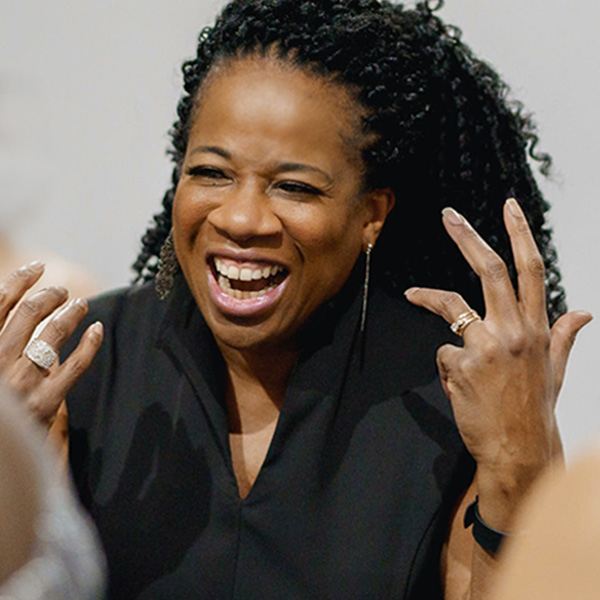“In my day-to-day life I spend a lot of time thinking about, and doing, land-based activities,” says Kai Thomas, BA’16. “I’m involved in small-scale regenerative agriculture and forest stewardship.”
It’s not the sort of thing one is accustomed to hearing from a rising literary star, but then, Thomas’s path has been unconventional in many ways.
He was speaking by phone from his current home in upstate New York, where he works at Soul Fire Farm, an Afro-Indigenous collective dedicated to the principles of sustainability, health, and environmental justice, and a seemingly ideal setting for a self-described “city kid with a yearning for nature.”
He designs and oversees carpentry workshops and helps tend to the property, but there are now other claims on Thomas’s time.
His 2023 novel In the Upper Country is one of the most acclaimed Canadian fiction debuts of recent years: it won the Atwood Gibson Writers’ Trust Fiction Prize, was shortlisted for both the Amazon Canada First Novel Award and the Governor General’s Literary Award for English-language fiction, and has garnered across-the-board glowing reviews in Canada and the U.S.
The book’s groundbreaking, genre-melding treatment of a heretofore largely neglected historical subject – the mid-19th century experience of former slaves in the southwestern Ontario terminus of the Underground Railroad – has borne such fruit that Thomas is now in the (very early) stage of writing a sequel.
Raised in Ottawa, the son of a Trinidadian-Canadian father and a mother from the British Isles, Thomas grew up in a reading-friendly household but harboured no particular ambition to be a writer in his youth.
That idea only took seed after he went to Montreal to pursue an undergraduate degree in anthropology and African studies at McGill. He gradually realized that he was more drawn to self-driven deep-dive historical research and the satisfactions of creative writing than he was to more conventional undergraduate pursuits.
“I took me six years to finish my BA.” says Thomas, with no indication of regret. “I had made the conscious choice not to confine myself to campus. McGill being in the middle of the city was a part of that – it felt natural to live and get involved in the community in other parts of the city, and commute to campus; I lived in Park-Extension for a long time and did community work in Little Burgundy. Overall, I’d say McGill provided a good container to learn some of the research skills that went on to serve me in writing the book, and certainly to have experiences both in and out of the university bubble.”
Along the way, Thomas was inspired by certain professors: he’s especially keen to cite art historian Charmaine Nelson, describing her as “an awesome teacher” whose example helped fire his passion for “filling in absences in the historical record.”
He has fond memories of spending days “going through the archive of the Montreal Gazette in the McGill Library, looking at runaway slave ads describing people who had escaped, in some cases, from places just down the street from where I was sitting. It’s a special thing to be able to draw those lines of connection to and from the present moment. And to make creative use of that knowledge – therein lies the excitement of fiction.”
As many critics and readers have noted, In the Upper Country is a novel where the historical Black female voice is honoured to a rare degree, chiefly in the person of young journalist and protagonist Lensinda Martin, whose connection to an elderly woman accused of murder provides a jumping-off point for the round of individual accounts at the book’s core. For Thomas, this was the result of an organic process rather than a conscious strategy.
“As a writer of fiction, there’s a certain point where your characters kind of make their presence known, and the best thing you can do is get out of their way and let them tell things,” he says. “Lensinda’s was a point of view that I hadn’t heard or read or seen represented much before, so I thought it was important to give her that prominence.”
The novel is laced with historical elements likely to be new to most readers: cross-border bounty hunters, Black-run newspapers, the inland seagoing tradition of the Lower Great Lakes, and – perhaps most illuminating – the deep, complex, fellow-outcast connections between Black and Indigenous people in 19th-century Canada. All help comprise a corrective to vast gaps in Canada’s national historical self-image.
Black Canadians, until fairly recently, were frequently treated as bit players in their own history when subjects like the Underground Railway were taught in schools.
“The narrative of the liberal white Canadian as saviour of various oppressed peoples… it’s not helpful to understanding history,” Thomas says. “It gets in the way of so much.
“It’s just not healthy for any population to neglect past traumas. That doesn’t mean that stories of heroism and philanthropy can’t be told. But we have the capacity as humans to understand both [the good and bad].”
It has been a remarkable year for Thomas and there are plenty of young writers who would decide to focus all their energy on writing after experiencing a similar level of success. Thomas is figuring out the ideal balance between his literary endeavours and his other interests. It’s a work in progress, with the significant added responsibility of two young children.
“Writing will always be a part of my life,” he says. “I’m at a point now where I feel compelled to follow what will give me the most freedom while preserving time with my family. It’s aspirational at this point.”
Meanwhile, Thomas draws satisfaction from watching his book make its way in the world. He’s been especially keen to gauge how readers respond to what he sees as a crucial underlying theme: the relationship of his characters to land, and their struggles to reclaim a birthright denied by colonialism.
In the author’s note for his book, Thomas wrote of his own awakening to the idea. “I began to understand my Black identity as an inheritance of enslavement, yes, but first and foremost of the theft of African peoples’ connection to land – in other words, the theft of indigeneity.”
“It’s natural that the importance of land should be a central idea in my writing, and for my characters, because land-based education is what I live and breathe, every day.”
Kai Thomas
“It’s ironic, I suppose, that I’ve written a book that I hope might inspire readers to put the book down, and to connect with whatever their natural environment is,” Thomas says. “But it’s natural that the importance of land should be a central idea in my writing, and for my characters, because land-based education is what I live and breathe, every day. It’s my world, my immediate surroundings. If any message bleeds through my writing, it’s that land can be a catalyst and a vehicle for empowerment and resilience.”


